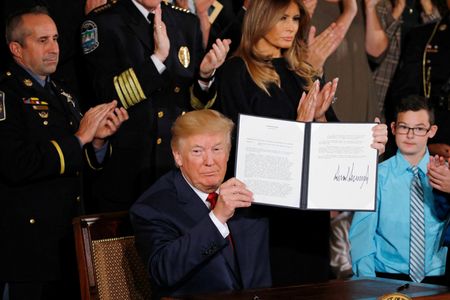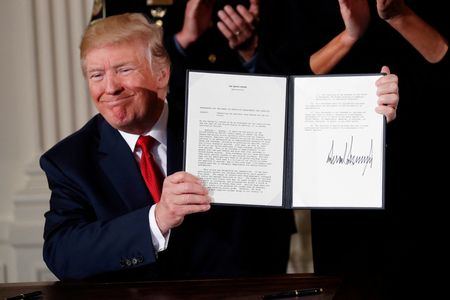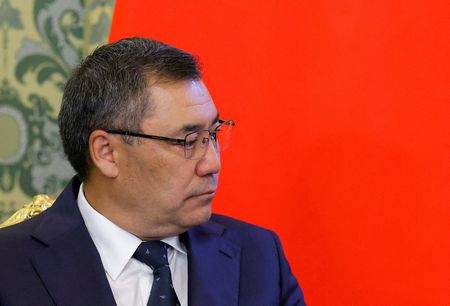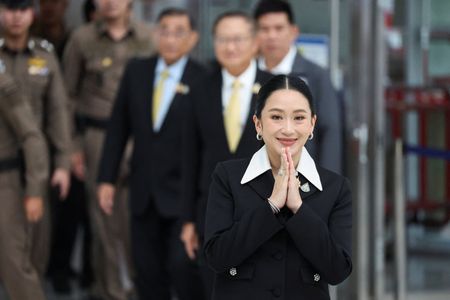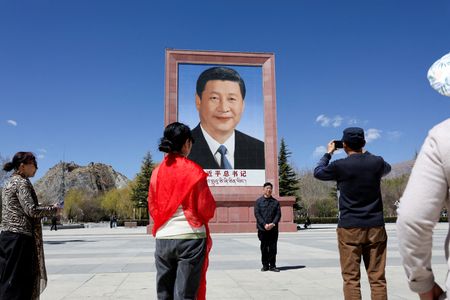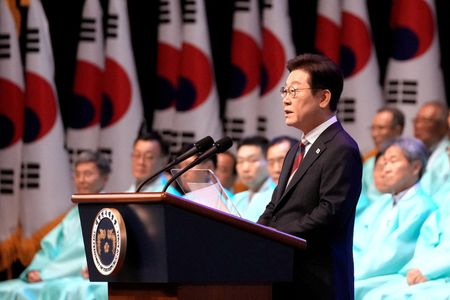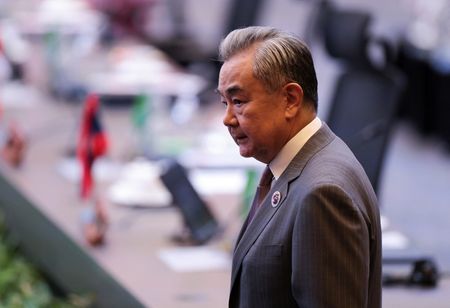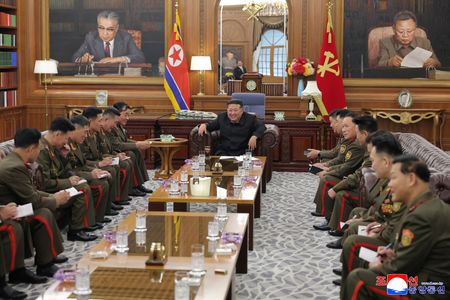By Michael Martina
WASHINGTON (Reuters) -Talks continue between the U.S. and China on tackling the fentanyl epidemic amid the bitter trade war between the world’s two largest economies, four U.S. officials familiar with the discussions told Reuters, even as American negotiators claim the Chinese are failing to negotiate in good faith.
The two sides are exchanging intelligence about traffickers and communicate frequently. But Beijing’s proposals to help resolve the crisis thus far are inadequate, the people said, testing the patience of U.S. President Donald Trump, who has pursued a more confrontational stance with China on drugs than did his predecessor Joe Biden.
Washington says Chinese chemical manufacturers and exporters provide the majority of precursor chemicals used by drug cartels to produce synthetic opioids, the cause of nearly 450,000 U.S. overdose deaths. China has long defended its tough drug laws and record of cracking down on smugglers, and says America must get a handle on its own addiction woes.
“The abuse of fentanyl in the United States is a problem that must be confronted and resolved by the United States itself,” Liu Pengyu, spokesman for the Chinese embassy in Washington, told Reuters.
In recent weeks, the Trump administration has engaged in direct talks with Chinese counterparts, mostly between the top staff at the Chinese embassy in Washington and the U.S. National Security Council, the four U.S. officials said. Staff at the U.S. embassy in Beijing have also been involved.
Trump negotiators have conveyed his desire for swift action by Chinese authorities to prosecute and convict China-based producers and sellers of precursors feeding the fentanyl trade, the U.S. officials said. China, in turn, has offered to regulate additional fentanyl precursor chemicals beyond those it already controls, a proposal the Americans say falls well short of what they’re looking for.
“Talk is cheap,” one of the U.S. officials said, adding the two sides were largely “at an impasse.”
In response to questions from Reuters about the counternarcotics talks, an administration official said the U.S. might consider additional punitive measures to compel China to take meaningful action on fentanyl precursors, including sanctions on Chinese banks. “Nothing is off the table,” the person said.
Reuters reporters last year purchased 6.6 kilos of precursors and pill-making equipment online from Chinese sellers who openly market to the illegal drugs trade as part of a multi-part investigation into fentanyl’s secretive global supply chain. As part of that series, “Fentanyl Express,” reporters detailed U.S.-China counternarcotics talks held during the Biden administration, negotiations that failed to wrest major concessions from Beijing, and previewed a more antagonistic approach planned by the second Trump administration.
Among Trump’s first moves was imposing tariffs now totaling 20% on Chinese imports over Beijing’s alleged failure to stem the flow of fentanyl precursors to drug cartels. Other rounds of tariffs in the president’s trade war have slapped baseline duties of 145% or higher on many Chinese goods, levels China has cautioned would undermine talks on counternarcotics.
“If (the U.S.) truly wants to address the fentanyl problem, it needs to revoke the unjustified tariffs, engage in equal consultation with China, and seek mutually beneficial cooperation,” said Liu, the Chinese embassy spokesman.
Beijing in the past has suspended dialogue on drugs when angered by Washington, doing so after a 2022 visit to Taiwan by then-Speaker of the House Nancy Pelosi. Biden got those talks back on track, and negotiations have continued under Trump.
‘BAD FAITH’
Since returning to the White House, Trump has named the opioid crisis as one of his top foreign policy priorities. He has designated drug cartels as foreign terrorist organizations. Some Canadian and Mexican goods have also been slapped with so-called fentanyl tariffs. But Trump has reserved particular vitriol for China, accusing Beijing of “actively sustaining and expanding the business of poisoning our citizens.”
Biden’s measured approach in engaging Beijing yielded some small wins but no dramatic breakthrough, something Trump’s team views as a failure. They see tariffs as a tool for compelling Chinese cooperation, despite China’s warnings to the contrary.
Following Trump’s initial tariffs over fentanyl, China offered to schedule two precursor chemicals: 4-Piperidone and 1-boc-4-piperidone.
That concession was easy for Beijing to make, the U.S. officials said, because China was already obligated to do so.
That’s because those chemicals were placed under international control in 2024 by the U.N. Commission on Narcotic Drugs. China is a member of that commission, and thus bound to regulate those precursors. Work on scheduling them is underway, according to a March report by the Chinese government on its fentanyl-control efforts.
Trump negotiators were underwhelmed. The Chinese offering “to do something that they’ve already agreed to, it’s essentially negotiating in bad faith,” a second U.S. official said.
Since Trump escalated the tariffs in recent weeks, Beijing has made additional proposals to schedule several more precursors, the U.S. officials said, an offer the Americans still deem insufficient.
China’s Ministry of Foreign Affairs said in a statement after Reuters published this article that it was “obvious to everyone who has goodwill and who has ill intentions,” and that the U.S. approach will “seriously undermine China-U.S. counternarcotics dialogue and cooperation.”
During Trump’s first term, China did take some steps to constrict the synthetic opioid pipeline. At the time, most fentanyl sold on U.S. streets was made in China. In 2019, Beijing placed fentanyl and its analogs under national control, effectively ending illicit exports of the finished product. But Chinese chemical companies quickly pivoted to supplying ingredients to the Mexican cartels that took over production, U.S. authorities say.
What the Trump team wants now is for China to crack down on Chinese chemical manufacturers and sellers catering to that illicit trade. Many market their wares openly online. Beijing has failed to make such prosecutions a priority, one of the U.S. officials said, despite evidence and leads supplied by the American side.
“Start putting big, important people behind bars as a signal to the whole industry or black market,” the first official said. “We just haven’t seen that.”
The Biden administration, too, pressed China to require its chemical sector to vet customers and better monitor where their exports are going.
But China has resisted out of concern that too much regulation would hamper the growth of its powerful chemical industry. Many chemicals used to make synthetic opioids also have legitimate uses. Tsang Wai-hung, an official with China’s National Narcotics Control Commission, last year told Reuters that it’s the responsibility of importing countries – not Chinese chemical companies – to investigate sketchy buyers suspected of purchasing legal precursors to manufacture fentanyl.
Tsang directed questions to China’s Ministry of Public Security, which oversees the National Narcotics Control Commission. The ministry did not respond to a request for comment.
China last year said it had targeted internet advertising related to fentanyl and its precursors, shuttering more than a dozen online platforms and hundreds of stores.
But recent Reuters interviews with more than 50 fentanyl users in Philadelphia, Boston, San Francisco, and Columbus, Ohio, showed the drug remains plentiful and cheap.
A third U.S. official warned that Trump could resort to more tariffs if he felt that China was dragging its feet.
Liu, the Chinese embassy spokesman, said his country won’t sit idly by.
“China never accepts power politics or hegemony,” Liu said. “If the United States insists on applying pressure and even goes down the path of extortion, China will surely take resolute countermeasures.”
(Reporting by Michael Martina in Washington;Additional reporting by Antoni Slodkowski in Beijing;Editing by Marla Dickerson)


